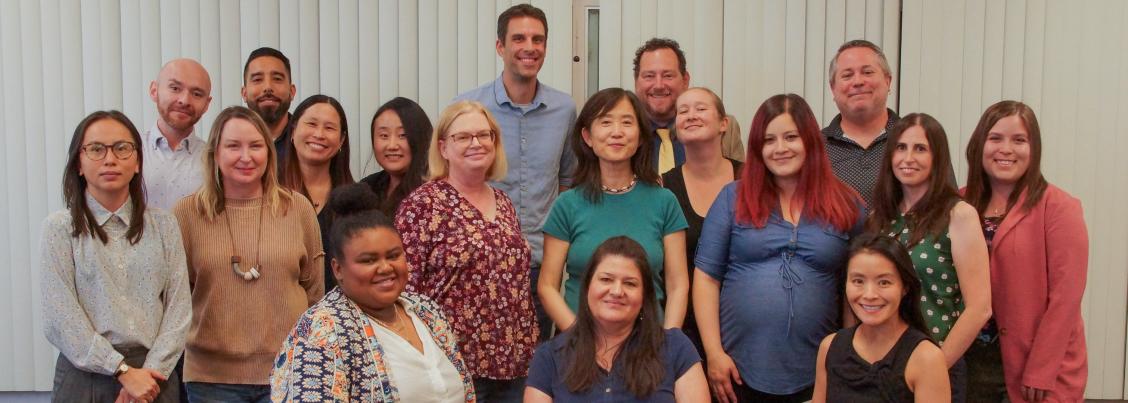
Biography
Education
Ph.D., 2013, UC Riverside
M.A., 2009, UC Riverside
B.A., 2003, University of Pennsylvania
Specialty Areas: Developmental Psychopathology, Quantitative Methods
Courses Taught
Psy 310 – Abnormal Psychology
Psy 320/L – Statistical Methods in Psychological Research & Lab
Psy 427 – Introduction to Psychological Testing
Psy 500 – Graduate Seminar in Professional Development
Psy 524 – Graduate Multivariate Statistics
Psy 534 – Latent Variable Analysis
Psy 692 – Graduate Seminar in Research Methodology
**Currently accepting new Research Assistants. For more information check out: http://www.csun.edu/~sarab/prospective.html
Selected Publications and Presentations
Publications
Berzenski, S.R., Yates, T.M. (In press). The differential influences of parenting and child narrative coherence on the development of emotion recognition. Developmental Psychology.
Grey, I.K., Berzenski, S.R., Yates, T.M. (2015). Coping in context: The role of resource availability on coping effectiveness among emancipated foster youth. Emerging Adulthood, 3(5), 295-305.
Berzenski, S.R., Yates, T.M., Egeland, B. (2014). A multidimensional view of continuity in intergenerational transmission of child maltreatment. In J. Korbin & R. Krugman (Eds.), Handbook of Child Maltreatment (pp. 115-129). Springer Netherlands.
Berzenski, S.R. & Yates, T.M. (2013). Preschoolers’ emotion knowledge and the differential effects of harsh punishment. Journal of Family Psychology, 27(3), 463-472.
Berzenski, S.R., Bennett, D.S., Marini, V. A., Sullivan, M.S., Lewis, M. (2013). The role of parental distress in moderating the influence of child neglect on maladjustment. Journal of Child and Family Studies.
Bennett, D., Marini, V., Berzenski, S.R., Carmody, D.P., Lewis, M. (2013). Externalizing problems in late childhood as a function of prenatal cocaine exposure and environmental risk. Journal of Pediatric Psychology, 38(3), 296-308.
Berzenski, S.R. & Yates, T.M. (2011). Classes and consequences of multiple maltreatment: A person- centered analysis. Child Maltreatment, 16(4), 250-261.
Berzenski, S.R. & Yates, T.M. (2010). A developmental process analysis of the impact of emotional abuse on relationship violence. Journal of Aggression, Maltreatment, and Trauma, 19(2), 180-203.
Presentations
*denotes student author
Berzenski, S.R., *Wess, R., Yates. T.M. (2017). The development of empathy in child maltreatment contexts: The role of self and parent representation. Poster presented at 2017 Society for Research in Child Development Biennial Meeting, Austin, TX.
Berzenski, S.R., *LaSalle Castro, R.A., *Li, T. (2017). Social development in impoverished contexts: The role of household poverty, neighborhood risk, and impulsivity. Poster presented at 2017 Society for Research in Child Development Biennial Meeting, Austin, TX.
*Galindo, J., *Navarro, C., Berzenski, S.R. (2017). Teen parenting and the influence of associated contextual risks on child conduct problems. Poster presented at 2017 Society for Research in Child Development Biennial Meeting, Austin, TX.
*LaSalle Castro, R.A., Berzenski, S.R. (2017). The development of inhibitory control: Negative emotionality, anxiety, and the protective influence of executive functioning. Poster presented at 2017 Society for Research in Child Development Biennial Meeting, Austin, TX.
*Navarro, C., *Galindo, J., Berzenski, S.R., Yates, T.M. (2017). Configurations of risk and their differential impact on psychopathology among ethnic groups: A latent class analysis. Poster presented at 2017 Society for Research in Child Development Biennial Meeting, Austin, TX.
*Navarro, L., Berzenski, S.R. (2017). Children’s pathways to school competence: Parental substance use, relationship quality, and coping skills. Poster presented at 2017 Society for Research in Child Development Biennial Meeting, Austin, TX.
*Ueno, L., Berzenski, S.R. (2017). Effects of caregiver substance abuse and corporal punishment on childhood ADHD symptoms. Poster presented at 2017 Society for Research in Child Development Biennial Meeting, Austin, TX.
*Wess, R., Berzenski, S.R., Yates, T.M. (2017). A pathway from childhood neglect to low academic performance: The role of social support for low income children. Poster presented at 2017 Society for Research in Child Development Biennial Meeting, Austin, TX.
Research Interests
My research investigates emotional development in the context of adversity, from a developmental psychopathology perspective. I am interested in the ways that emotional development is altered in the context of child maltreatment, as well as the ways in which emotion competence skills may mitigate the negative impact of adversity on adaptation. In addition, I am interested in approaching these questions using diverse quantitative analytic techniques and measurement approaches, as well as applying a developmental perspective to quantitative issues. My program of research is composed of the following three interrelated areas of study:
Child Maltreatment
This line of research explores development in contexts of adversity, particularly child maltreatment, to clarify specific mechanisms by which adversity eventuates in negative adjustment and/or resilience. In particular, this research focuses on the importance of specific features (e.g., severity, chronicity) and subtypes (e.g., physical abuse, emotional abuse) of child maltreatment.
The Development of Emotion Competence
My second line of research investigates the development of emotion competence in contexts of both adversity and typical experience. Emotion competence is characterized by capabilities in emotion knowledge (understanding one’s own emotions and perceiving emotions in others), emotion expression (displaying appropriate levels and valences of emotions), and emotion regulation (the ability to control emotions during a challenging situation).
Domains of Self-Regulation
My third line of research seeks to understand the complexity of an individual’s response to a challenging situation, which involves physiological arousal, felt emotion, expressed emotion, and often a behavioral response. In investigating these capabilities, I draw heavily on observational data of children’s responses to challenging situations in the laboratory (e.g., a disappointing gift task, a frustrating building task). With regard to dynamic systems of regulation, I am investigating the predictive value of concordance among domains, specific profiles of activation, as well as the interrelations between domains of regulation across development.




